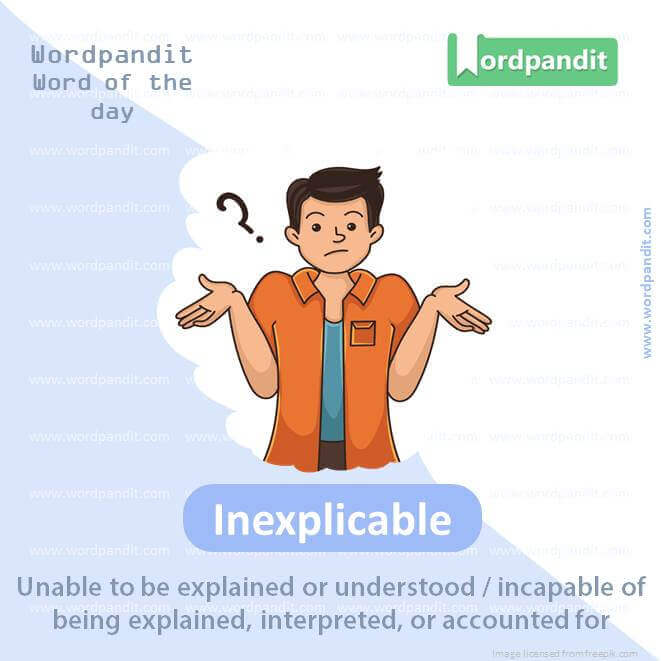Daily Vocabulary Words: List of Daily Used Words
Hi there. Welcome to this special section @ Wordpandit.
Our endeavour here is straightforward: highlighting important daily vocabulary words, you would encounter in The Hindu. This is your repository of commonly used words; essentially, we are posting a list of daily used words. Hence, this has significant practical application as it teaches you words that are commonly used in a leading publication such as The Hindu.
Visit the website daily to learn words from The Hindu.
WORD-1: Acquittal
CONTEXT: Despite the overwhelming evidence presented by the prosecution, the defendant was granted acquittal by the jury, much to the surprise of the public.
SOURCE: Example Sentence
EXPLANATORY PARAGRAPH: Imagine being accused of a crime but then being declared “not guilty” after a trial. That’s what “acquittal” means—it’s a legal judgment that someone is not guilty of a crime.
MEANING: A judgment that a person is not guilty of the crime with which they have been charged (noun).
PRONUNCIATION: uh-KWIT-uhl
SYNONYMS: Exoneration, vindication, clearance, absolution, liberation
USAGE EXAMPLES:
1. The acquittal of the defendant shocked many observers of the trial.
2. Despite the acquittal, doubts remained about the defendant’s innocence.
3. The acquittal was seen as a victory for the defense team.
4. The jury’s decision resulted in the defendant’s acquittal.

WORD-2: Dubious
CONTEXT: The company’s claims about its new product were met with dubious skepticism from consumers, who questioned the validity of its advertised benefits.
SOURCE: Example Sentence
EXPLANATORY PARAGRAPH: Imagine someone telling you a story that sounds too strange or unlikely to be true. That’s what “dubious” describes—it’s something that is doubtful, questionable, or not completely reliable.
MEANING: Hesitating or doubting.
PRONUNCIATION: DOO-bee-uhs
SYNONYMS: Questionable, uncertain, suspicious, doubtful, dubious
USAGE EXAMPLES:
1. His dubious explanation did little to convince the authorities.
2. The proposal was met with dubious skepticism from the board members.
3. She gave him a dubious look when he claimed he had no knowledge of the incident.
4. The source of the information was deemed dubious and unreliable.

WORD-3: Repudiation
CONTEXT: The government issued a formal repudiation of the allegations made by the opposition party, stating that they were baseless and politically motivated.
SOURCE: Example Sentence
EXPLANATORY PARAGRAPH: Imagine publicly denying something that someone said about you because it’s completely untrue. That’s what “repudiation” is—it’s the rejection or denial of the truth or validity of something.
MEANING: Rejection or denial of a proposal or idea; refusal to accept (noun).
PRONUNCIATION: ri-pyoo-dee-EY-shuhn
SYNONYMS: Rejection, denial, disavowal, renunciation, refusal
USAGE EXAMPLES:
1. The repudiation of the treaty sparked tensions between the two nations.
2. His repudiation of the accusations was met with disbelief by many.
3. The company issued a public repudiation of the allegations made against its CEO.
4. The candidate’s repudiation of extremist views gained support from moderate voters.

WORD-4: Cognisance
CONTEXT: The court took cognisance of the new evidence presented by the defense, leading to a delay in the trial proceedings.
SOURCE: Example Sentence
EXPLANATORY PARAGRAPH: Imagine being fully aware of something happening around you. That’s what “cognisance” describes—it’s the awareness or knowledge of something, especially through observation or investigation.
MEANING: Awareness, notice, or understanding of something; being conscious
of what is happening (noun).
PRONUNCIATION: KOG-nuh-zuhns
SYNONYMS: Awareness, consciousness, recognition, realization, perception
USAGE EXAMPLES:
1. The authorities took cognisance of the growing public unrest and implemented measures to address it.
2. She took cognisance of the warning signs but chose to ignore them.
3. The court must take cognisance of all relevant factors when making its decision.
4. The company’s management was accused of failing to take cognisance of the safety concerns raised by employees.
WORD-5: Stringent
CONTEXT: The company implemented stringent security measures to prevent unauthorized access to sensitive data.
SOURCE: Example Sentence
EXPLANATORY PARAGRAPH: Imagine rules or standards that are very strict and must be followed precisely. That’s what “stringent” means—it’s something that is precise, strict, and rigorously enforced.
MEANING: Strict, precise, and exacting (adjective).
PRONUNCIATION: STREN-jent
SYNONYMS: Strict, rigorous, severe, tight, tough
USAGE EXAMPLES:
1. The school has stringent admission requirements for its prestigious program.
2. Stringent safety regulations were imposed following the accident.
3. The company enforces stringent quality control measures to ensure product consistency.
4. The government announced stringent new measures to combat tax evasion.

WORD-6: Inexplicable
CONTEXT: The sudden disappearance of the artifacts from the museum was an inexplicable mystery that baffled investigators.
SOURCE: Example Sentence
EXPLANATORY PARAGRAPH: Imagine trying to explain something that happened, but it just doesn’t make sense—it’s beyond reason or understanding. That’s what “inexplicable” means—it’s something that cannot be explained or understood.
MEANING: Unable to be explained or understood / incapable of being explained, interpreted, or accounted for.
PRONUNCIATION: in-EKS-pli-kuh-buhl
SYNONYMS: Unexplainable, incomprehensible, baffling, mysterious, bewildering
USAGE EXAMPLES:
1. The sudden surge in popularity of the song was inexplicable to the band’s members.
2. His inexplicable behavior left his friends puzzled and concerned.
3. The disappearance of the ship remains an inexplicable mystery to this day.
4. The inexplicable rise in prices puzzled economists and policymakers.
WORD-7: Revocation
CONTEXT: The government issued a revocation of the driving license due to repeated traffic violations.
SOURCE: Example Sentence
EXPLANATORY PARAGRAPH: Imagine being given a privilege or permission, and then having it taken away because you did something wrong. That’s what “revocation” means—it’s the official cancellation or withdrawal of a document, privilege, or power.
MEANING: The official cancellation or annulment of something (noun).
PRONUNCIATION: rev-uh-KEY-shuhn
SYNONYMS: Cancellation, annulment, withdrawal, repeal, rescinding
USAGE EXAMPLES:
1. The company issued a revocation of the employee’s security clearance.
2. The landlord threatened revocation of the lease if the rent was not paid on time.
3. The court ordered the revocation of the defendant’s probation due to a violation of its terms.
4. The government announced the revocation of the controversial law following widespread protests.

WORD-8: Enacting
CONTEXT: The city council is currently in the process of enacting new regulations to address the issue of urban sprawl.
SOURCE: Example Sentence
EXPLANATORY PARAGRAPH: Imagine writing a script and then acting it out on stage. “Enacting” is similar—it’s the process of making something, like a law or regulation, official by putting it into effect or practice.
MEANING: Making into a law or a rule (Verb).
PRONUNCIATION: en-AK-ting
SYNONYMS: Implementing, enacting, executing, instituting, putting into effect
USAGE EXAMPLES:
1. The government is considering enacting stricter penalties for drug offenses.
2. Enacting policies to promote renewable energy is a priority for the environmental organization.
3. The council is tasked with enacting legislation to improve public safety.
4. The president signed the bill into law, enacting sweeping reforms.
WORD-9: Enumeration
CONTEXT: The enumeration of the rights and freedoms guaranteed by the constitution is a fundamental aspect of legal education.
SOURCE: Example Sentence
EXPLANATORY PARAGRAPH: Imagine making a list of all the things you need to do for the day—that’s “enumeration.” It’s the action of mentioning a number of things one by one, usually in a list or sequence.
MEANING: The action of mentioning a number of things one by one (noun).
PRONUNCIATION: ih-NOO-muh-rey-shuhn
SYNONYMS: Listing, cataloging, itemization, counting, detailing
USAGE EXAMPLES:
1. The enumeration of the company’s assets was part of the audit process.
2. The constitution provides for the enumeration of citizens’ rights and freedoms.
3. She completed the enumeration of tasks for the day and began working on them.
4. The enumeration of the various species in the region was a daunting task for the biologists.
WORD-10: Fragmented
CONTEXT: The country’s political landscape has become increasingly fragmented, with multiple parties vying for power.
SOURCE: Example Sentence
EXPLANATORY PARAGRAPH: Imagine breaking something, like a plate, into many pieces. “Fragmented” describes something that has been broken into parts or has become divided, often referring to groups, organizations, or systems.
MEANING: Broken into small parts or pieces; characterized by disunity or division (adjective).
PRONUNCIATION: FRAG-muhn-ted
SYNONYMS: Disintegrated, shattered, splintered, divided, disjointed
USAGE EXAMPLES:
1. The company’s once unified workforce has become fragmented due to internal conflicts.
2. Fragmented opposition parties struggle to form a cohesive strategy against the ruling party.
3. The market is fragmented, with many small businesses competing for customers.
4. The nation’s history is marked by periods of fragmented governance and internal strife.
Vocabulary Daily Words
Among the myriad aspects of language learning, the role of ‘vocabulary daily words’ attests to their undeniable importance. These everyday words form the bedrock of communication. Whether used in casual chat or formal discussion, the fluency and understanding of ‘vocabulary daily words’ can significantly uplift the quality of interaction. However, the vital question is, how to effectively learn these ‘vocabulary daily words’?
The crux of learning ‘vocabulary daily words’ lies in a well-rounded approach that encompasses exposure, understanding, memorization, and practice. Rote memorization might seem like a quick solution, but it lacks context and, thereby, retention. Hence, opt for a diverse range of resources like books, newspapers, podcasts, and digital media. These will bring ‘vocabulary daily words’ to life, providing real-life usage examples and making the learning process inherently engaging.
Next, using memory-enhancing techniques can significantly improve retention of ‘vocabulary daily words’. Techniques such as flashcards or the Leitner System align with the principles of spaced repetition, allowing more effective and long-term learning. Incorporating mnemonic devices, associating new words with unique stories or images, can further facilitate this learning process.
The key to fully grasping ‘vocabulary daily words’ lies in practical usage. Make it a habit to use these words in your daily communications. Whether it’s a friendly conversation, a professional email, or a social media post, try integrating these new words. Doing so provides hands-on practice, strengthening your comprehension and application of these words.
In a nutshell, ‘vocabulary daily words’ are a treasure in the language learning landscape. By harnessing diversified resources, utilizing memory techniques, and actively using these words, your grip on the ‘vocabulary daily words’ will strengthen significantly. So, turn the pages, hit play, start a conversation, and let these ‘vocabulary daily words’ shape the story of your linguistic journey.











